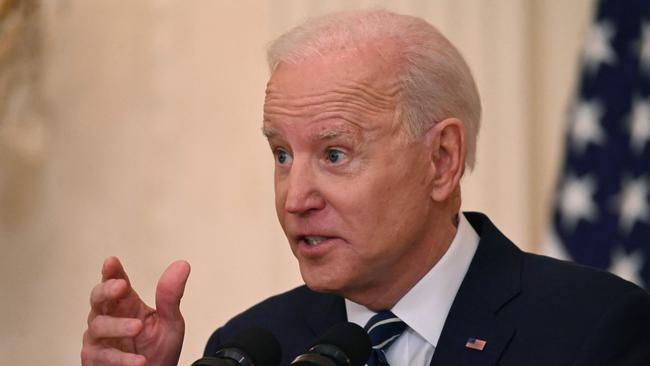Democracy under threat, says Joe Biden
Joe Biden has declared the future of the democratic model is at stake, as he summons an ‘alliance of democracies’ to Washington.

Joe Biden has declared the future of the democratic model is at stake, as the US President revealed he would soon host an “alliance of democracies” in Washington DC.
Prime Minister Scott Morrison is preparing to attend the meeting — expected to be held in the middle of the year and to include the leaders of Japan, South Korea, India, Canada, the UK, France, Italy and Germany — as the new US administration continues to co-ordinate closely with allies and partners on its dealings with President Xi Jinping’s China and President Vladimir Putin’s Russia.
Mr Biden cast the upcoming summit in grand terms at his first press conference at the White House.
“Look, I predict to you, your children or grandchildren are going to be doing their doctoral thesis on the issue of who succeeded: autocracy or democracy?” he said. “Because that is what is at stake, not just with China.”
Mr Biden’s comments followed days of bristling by China over co-ordinated sanctions imposed on it over human rights abuses in Xinjiang by the US, Canada, the UK and the EU.
That set off an eruption of outrage on the Chinese internet demanding a boycott of clothing companies including Sweden’s H&M, America’s Nike and Britain’s Burberry, who had made statements — many a year old — about not using cotton from Xinjiang in their products because of concerns about forced labour.
The ongoing anger underlined the perils of the world’s second biggest economy, which Beijing plans to grow by an average of almost 5 per cent a year until 2035 to surpass America.
This week, China’s diplomats also lashed out at Australia over comments about Xinjiang, as Beijing continues a pressure campaign on the Morrison government that has lasted 10 months and led to trade strikes on exports worth $20bn a year. Speaking to an audience of business people on Thursday, Australia’s ambassador to China, Graham Fletcher, said Beijing thought “economics dictates everything else”.
“They think if they can cause enough pain, that will surely deliver the political outcome they want,” Mr Fletcher said.
“It’s ironic that China insists no amount of external pressure or criticism — whether it’s on Xinjiang or whatever — will prompt it to change course. And yet it expects other governments to … just backtrack on things we consider our core interests.”
Mr Biden said he had told Mr Xi in their two-hour phone call in February that “as long as you and your country continues to so blatantly violate human rights, we’re going to continue, in an unrelenting way, to call to the attention of the world and … make it clear what’s happening”.
“The moment a president walks away from that, as the last one did, is the moment we begin to lose our legitimacy around the world,” Mr Biden said shortly before a virtual meeting with European leaders on Friday (AEST).
Mr Biden also recounted his long personal relationship with China’s leader.
“He is very, very straightforward. Doesn’t have a democratic — with a small “D” — bone in his body. But he’s a smart, smart guy,” Mr Biden said. “He’s one of the guys, like Putin, who thinks that autocracy is the wave of the future and democracy can’t function in … an ever-complex world.”
Mr Biden said he also told Mr Xi that America was not “looking for confrontation”, but that the rising power must “play by the international rules: fair competition, fair practices, fair trade”.
China’s ambassador in Washington, Cui Tiankai, said Beijing opposed any “attempt to divide the world into different camps”.
“We don’t think this kind of approach is a solution. Actually, this is a problem in itself,” he said.
Ben Scott, the director of the Rules-Based Order Project at the Lowy Institute, said the new American president was clearly personally committed to putting the defence of democracy at the core of his foreign policy.
“His summit of democracies is a valuable opportunity for us to work with our close ally on common objectives - defending democracy and the rules-based order,” said Mr Scott, who previously worked at Australia’s Office of National Intelligence.
He said the democracy grouping, along with the Quad, could “help balance Chinese power”.
“But Canberra is rightfully leery of the over ambitious-democracy promotion of the George W. Bush-era and of applying a binary democracy-autocracy lens to the Indo-Pacific,” he told the Weekend Australian.
“Our region demands a more nuanced policy. The real test for the industrialised democracies, who are usually economic competitors, will be whether they can cooperate to balance China’s geoeconomics power.”




To join the conversation, please log in. Don't have an account? Register
Join the conversation, you are commenting as Logout